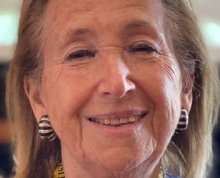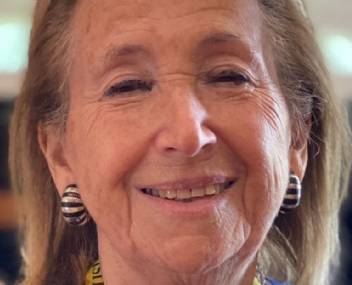
Hannah Lewis is a Holocaust survivor who spoke to the School about living through the Nazi era in Poland during the Second World War.
Before she spoke, Upper 4 and Lower 6 students took part in a project with educators from the Holocaust Education Trust who, with the USC Shoah Foundation, hope to immortalise the stories of Holocaust survivors and through technology, allow future generations to not only hear their stories, but also ask them questions. Our sincere thanks to Mrs Lewis for taking the time to sharing her experiences for our students’ benefit. Katie, Lower 6 and Maya, Upper 4 share their reactions below.
Hannah’s talk about her experiences was incredibly moving. She began by telling us about her happy family life living in Poland before the arrival of the Nazis, which was followed in 1942 by the setting up of camps and the deployment of Einsatzgruppen shooting squads, targeting the Jewish population. She described life in the camp the family was marched to at Adampol and how she tried to protect Schlomo, her younger cousin, who was unable to hear or speak, making him a target for the Nazis. Hannah tragically lost Schlomo, despite her best efforts to keep him safe. One of the most striking and memorable moments of her story was when her father, a Partisan fighting against the Nazi regime, had news of a new Einsatzgruppen attack and came to take try to take his wife and daughter to somewhere safe. In an act of incredible bravery, Hannah’s mother decided to stay behind and take care of Hannah, who had typhus and was too ill to travel. The next morning, tragically, Hannah’s mother was shot. In History we read many stories about acts of personal bravery, but to hear from a real person how a mother’s sacrifice meant her child survived, was touching. We can only hope that when we are given the opportunity to be brave, we can be as courageous as Hannah’s mother. Hannah left Poland after the war, travelling eventually to the UK, where she has lived for the last 60 years.
After her testimony Hannah answered questions. Pupils asked her about the long-term impact of her experiences and whether she was ever able to forget or move on from what had happened to her. She explained she could accept but never forgive. She was asked what had inspired her to begin working with the HET and give her testimony and she explained it was watching Schindler’s List and empathising with the girl in the red coat.
Hannah highlighted to us the importance of real people’s stories when it comes to talking about events in History, as we can become lost in the numbers and the scale of the disaster. Hannah’s testimony allowed us to see the impact of the Holocaust on one seven-year-old girl, who lost everyone in her family except her father. I think her audience fully appreciated that it is very difficult for Hannah to revisit her story, but by telling it, she believes she is helping young people learn about the importance of tolerance and the danger of being a bystander to extremism in the modern world.
Katie, Lower 6
This Summer Term, we have been studying the Holocaust. During lessons, we were also tasked with the making a memorial commemorating the Holocaust in general, or specific aspects of it that were interesting to us, making us think in more detail about the events. However, nothing that could be taught in a classroom could convey quite how terrifying the war was for people who lived through the Holocaust, such as Hannah Lewis. Hannah is a holocaust survivor who had the courage to come to our school and share her sad story.
Hannah Lewis was born in Poland in 1937. During her lifetime she was taken from her home with just one hour’s notice and was forced to walk to the Adampol forced-labour camp alongside her parents, grandfather, uncle and cousin, with the constant threat of being shot. In the camp, both her grandfather and uncle were immediately taken away, and over a year later she witnessed her much loved cousin being taken away and saw her mother murdered fifty meters in front of her. Everyone she had ever loved died inside that camp, except her father who escaped whilst working on the fields, died. After the war had ended, and the Germans were fleeing the camp, she was reunited with her father who had been fighting for the Allies. He had been sabotaging the Nazis by blowing up important train tracks and ammunition stores.
Hannah’s speech showed courage and compassion about her past as she feels it is her ‘duty’ to teach people about the horrors that powerful people like Hitler can do. She shared with us the true terror of the Holocaust and how the Germans showed no remorse for anyone, even young children like her. Her testimony reminded us that when we read about the six million people taken by the Germans, every person had a family and a story of what happened to them. She also demonstrated to us how you can grow from the past. When a student asked the question “If you ever met a Nazi soldier today, could you ever forgive them?” she replied that she could never possibly forgive what they did, especially to her mother and cousin, but that she had learned to accept the past as it would be the only way to start leading a ‘normal’ life.
Maya, Upper 4 student


.jpg&command_2=resize&height_2=85)
.jpg&command_2=resize&height_2=85)


